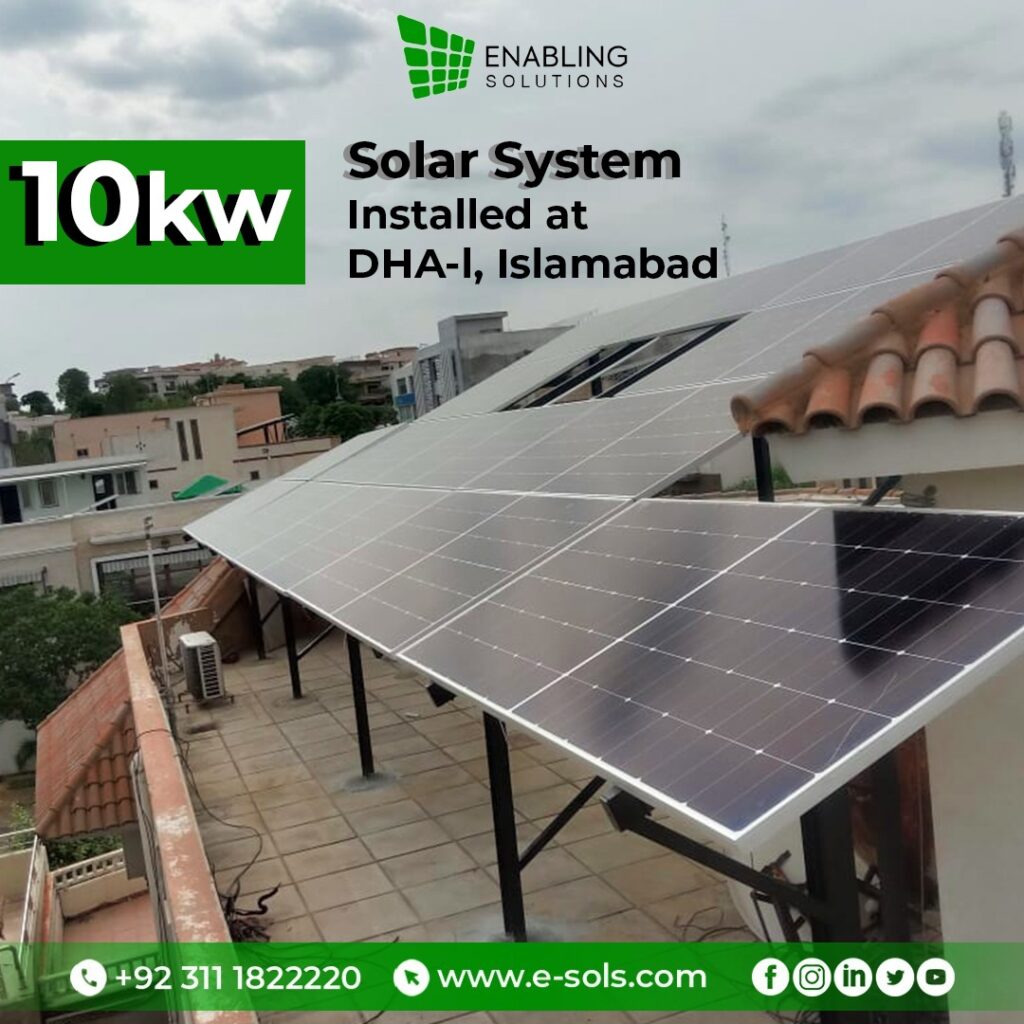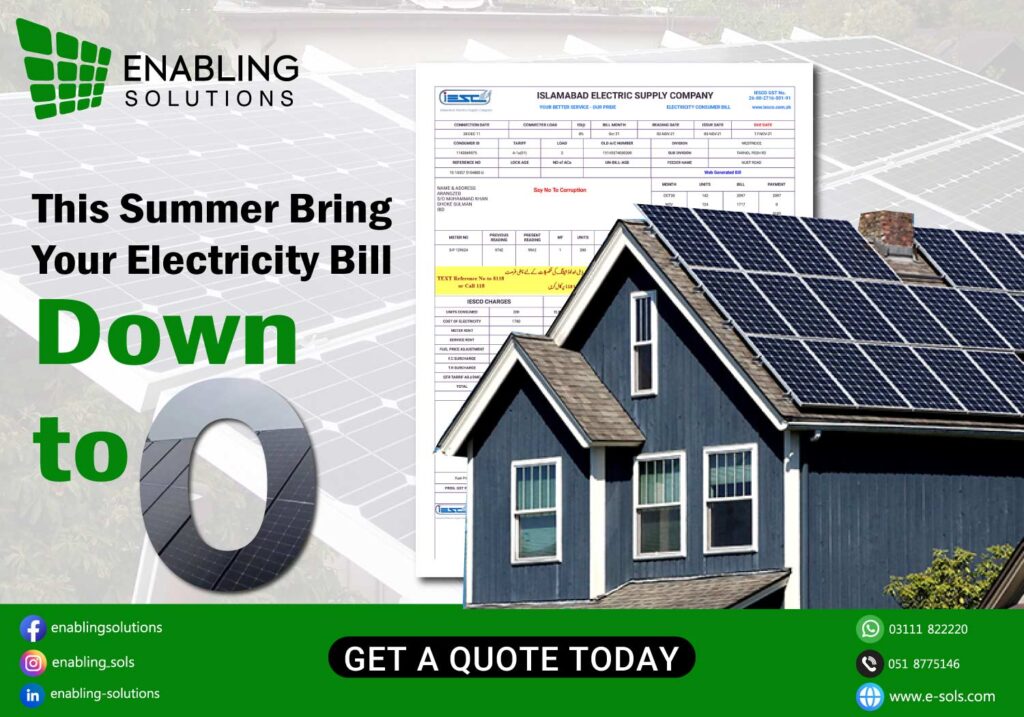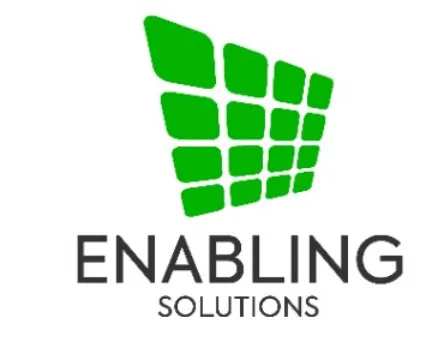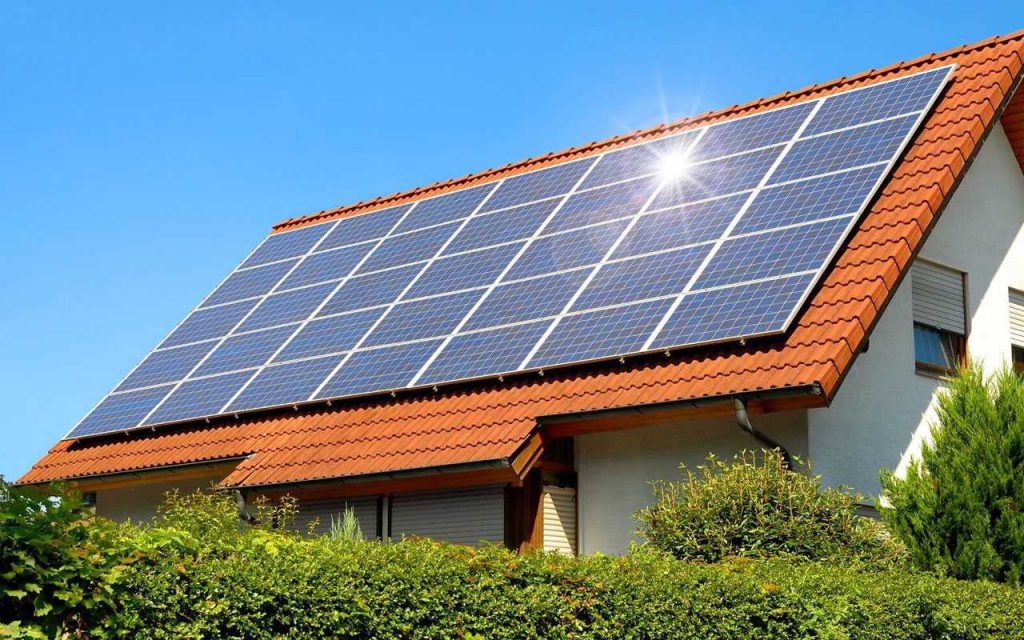The popularity of solar panels for home is on the rise, and for good reason. Solar panels provide a renewable source of energy, help reduce energy bills, and can increase a home’s value. As we know electricity crisis is the major issue of Pakistan since last many years. it has effected the living standard of the people. In may cities, electricity shortfalls has reached up to 14 hours to 16 hours.
Luckily, Pakistan is blessed with the solar energy, in this way solar panels for home is the best options for the residents to provide peaceful and pollution free energy to home. Choosing the right solar panels for home can be overwhelming, but finding the best one for your home is essential.

Enabling Solutions provides most reliable, best and professional services of solar panels for home in Punjab Region. Enabling solutions is providing most affordable solar panels for home. They have delivered innumerable projects. They experienced in on-grid, off-grid and hybrid solar system all over the Pakistan. there fore, avail the services of Enabling Solutions if you want to install solar panels for home.
Types of Solar Panels for home
There are various types of solar panels for home to choose, each with its own advantages and disadvantages.
Monocrystalline solar panels
-
- Made from a single silicon crystal
-
- Most efficient type of solar panel
-
- Typically more expensive
Polycrystalline solar panels
-
- Made from multiple silicon crystals
-
- More affordable than monocrystalline panels
-
- Slightly less efficient than monocrystalline panels
Thin-film solar panels
-
- Made from thin layers of semiconductor material
-
- Flexible and lightweight
-
- Less efficient than crystalline solar panels
BIPV solar panels
-
- Incorporate solar cells into building materials
-
- Can serve a dual purpose as a building material and energy source
-
- Appearance can be customized to match the building’s architecture
Hybrid solar panels
-
- Combine two or more types of solar cells
-
- Designed to increase efficiency and performance
-
- Can be more expensive than single-cell solar panels
Efficiency Ratings
Solar panel efficiency refers to the amount of sunlight that a panel can convert into usable energy. The higher the efficiency rating, the more power a panel can produce.
What is solar panel efficiency?
Solar panel efficiency is measured by a panel’s ability to convert sunlight into electricity. Efficiency is expressed as a percentage of the amount of energy received to the amount of energy produced.
How to calculate solar panel efficiency
To calculate solar panel efficiency, you need to divide the amount of energy produced by the panel by the amount of sunlight it receives. This will give you a percentage that represents the efficiency rating.
Best efficiency ratings for solar panels
Monocrystalline solar panels typically have the highest efficiency ratings, with some models boasting efficiency levels of over 22%.
Factors that affect solar panel efficiency
There are several factors that can affect the efficiency of solar panels, including temperature, shading, and the angle of the panels.
Features to Consider
When choosing a solar panel, there are a few key features to consider that can impact the panel’s performance and durability.
Durability
Solar panels require protection from the elements, so it is important to choose a panel with a durable frame and a tempered glass cover.
Warranty
A solar panel’s warranty can vary depending on the manufacturer. Look for warranties that cover at least 20 years and provide coverage for any potential defects.
Aesthetics
Solar panels come in a variety of colors, shapes, and sizes. Choose a panel that complements your home’s architecture and exterior design.
Installation Requirements
Consider the installation requirements, such as the available roof space and orientation, when choosing a solar panel. Some panels may require additional hardware or specific installation techniques.
Panel Size and Output
The size and output of a solar panel can impact its performance and ability to meet your energy needs.
Determining the right size for your needs
The size of your solar panel will depend on several factors, such as the amount of available roof space, the amount of energy you need, and your budget.
What to consider when determining panel output
Panel output is measured in watts and can vary depending on a variety of factors, such as manufacturer, size, and efficiency rating. Consider your energy needs and the amount of sunlight your roof receives when choosing a panel with the appropriate output.
Best panels in terms of size and output
Monocrystalline solar panels typically have the highest output ratings, making them a good choice for homes with limited roof space.

Performance in Different Climate Conditions
Different climate conditions can impact a solar panel’s performance and energy output.
How different climate factors affect panels performance
Extreme temperatures, precipitation, and humidity can all impact a panel’s performance. It is important to choose a panel that is designed to perform well in the local climate.
Best panels for hot and cold climates
Thin-film solar panels can perform well in both hot and cold climates due to their temperature-resistance and flexibility.
Compatibility with Different Roof Types
Not all solar panels are compatible with all roof types. Consider your roof’s shape and material when choosing a solar panel.
-
- Flat Roof Panels
Flat roof panels are designed to sit directly on a flat roof surface and can be tilted to maximize sunlight exposure.
-
- Curved Roof Panels
Curved panels are often custom-made to fit the contours of curved roofs.
-
- Tilted Roof Panels
Tilted roof panels are designed to be installed on sloped roofs and are generally positioned to face north or south to maximize sunlight exposure.
-
- Tiles or Shingle Roofs
Solar panels can also be mounted directly onto existing tiles or shingles, but require additional hardware and installation techniques.
Affordability
Solar panels can be a significant investment, so it is important to choose a panel that is within your budget.
-
- The cost of Solar Panels
The cost of solar panels can vary widely depending on the type, size, and manufacturer. On average, homeowners can expect to spend between $15,000 and $25,000 for a complete solar panel system.
-
- Best solar panels in the market for your budget
Polycrystalline solar panels are a more affordable option, while still providing efficient energy production.
-
- Return on Investment
While the initial cost of solar panels can be high, the long-term savings on energy bills can provide a significant return on investment.
Installation Process
The installation process for solar panels can vary depending on the manufacturer, type, and complexity of the system.
What to expect during installation
Installation typically involves mounting the panels to the roof and connecting them to the home’s electrical system.
Professional installation versus DIY
While DIY installation is possible, it is highly recommended that homeowners hire a professional to ensure proper installation and safety.
The Cost of Installation
The cost of installation can vary depending on the complexity of the system and the installer’s fees.
Maintenance and Servicing
Proper maintenance and servicing can extend the lifespan of a solar panel system.
-
- How to maintain your panels
Regular cleaning and inspection can help maintain the efficiency and performance of the panels.
-
- Handling repairs
In the event of damage or defects, it is important to contact the manufacturer or installer to handle repairs.
-
- Servicing your panels
Some manufacturers offer regular servicing and maintenance programs that can help ensure the long-term performance and efficiency of the solar panel system.
-
- Solar Panel Incentives
There are various incentives available to homeowners who choose to install solar panels for home.
What are solar incentives?
Solar incentives include tax credits, rebates, and other financial incentives offered by federal and state governments and utility companies.
-
- Tax Credits and Rebates
Homeowners can receive tax credits and rebates for a percentage of the total cost of the solar panel system.
-
- Federal and State incentives
Federal and state governments offer various incentives for homeowners who choose to use solar panels for home, including net metering programs.
-
- Net Metering
Net metering programs allow homeowners to sell excess energy back to the grid, offsetting energy bills and increasing savings.
The Future of Solar Panels for Home
The future of solar panels for home is bright, with emerging technologies and innovations that promise even greater efficiency and performance.
-
- Emerging Technologies
New technologies, such as solar shingles and thin-film solar cells, offer new opportunities for homeowners to harness solar power.
-
- New Trends
New trends in energy storage and smart home technology are making solar panel systems more efficient and integrated.
-
- Innovations to Look out For
Improved battery storage and more efficient panel designs are just a few of the innovations to look out for in the near future.
Conclusion
Choosing the best solar panels for home involves considering a variety of factors, including type, efficiency, durability, and affordability. With growing incentives and improving technology, solar panels for home are becoming an increasingly accessible and attractive option for homeowners looking to reduce their energy bills and minimize their environmental impact.






